Three Billboards Outside Ebbing, Missouri
Frances McDormand steals the show in this deceptively complex, brilliantly dark crime drama from Martin McDonagh
Plot summary
Frustrated by the local police department’s month of inaction in her daughter’s murder case, Mildred Haynes (Frances McDormand) hires three billboards to write a message to the Sheriff Willoughby (Woody Harrelson). Her act of provocation sends ripples through the town, affecting the lives of everyone from racist cop Jason Dixon (Sam Rockwell) to kindly soul James (Peter Dinklage). From violent confrontations to hushed gestures of support, Mildred must deal with the consequences of her actions on her quest for justice.

Hear the name ‘Frances McDormand’ and chances are your mind will jump straight to Fargo’s Margie, one of ‘90s cinema’s great roles and the performance that has always defined the actress’ career. Until now. Her character in Martin McDonagh’s Three Billboards Outside Ebbing, Missouri is much more brittle than her more northern counterpart, packing a confrontational aggression that can’t hide the deep wounds of having her institutional trust fatally shaken. But, in McDormand’s steady hands, she’s brought to life with the same delicacy, the same ravishing sense of humanity, and she burns into your memory with equal resonance.
Tragedy is etched onto the face of Mildred Haynes, a mother who’s had to endure the greatest pain a parent can imagine and the isolation that comes with not quite being able to express herself to those around her. She wanders through the frame like an ageing gunslinger stuck out of time – one of McDormand’s cited influences was John Wayne – and tries to navigate her emotions in a world she doesn’t understand. Much like with Margie, McDormand imbues Mildred with a deep sense of personal history that roots each decision in relative rationality and unifies her alternating levity, sombreness and violent anger.
It’s also through McDormand, and the performances of those around her, that the film is able to knit together the contrasting tones as skilfully as it does. McDonagh’s script is a deceptively complex little beast, introducing its protagonist as a grieving mother out for retribution and setting up a classic revenge narrative before pulling on the breaks and dispersing itself around the town. Thanks to McDonagh’s rich grasp of character and a roster of stalwart thespians operating at maximum levels, each resident is layered, complicated and bursting with life. As the film weaves in and around the murky interrelationships between these dynamic beings and forces them to challenge their various prejudices and assumptions, it is masterfully weaves from bracingly dark humour to an aching sense of melancholy without missing a beat. So strong is the thematic weight behind it, it taps into a deep vein of humanistic truth and offers a surprising, hard-hitting well of catharsis.
Which isn’t to say that the sense of catharsis is particularly easy. McDonagh’s MO has always been finding that sweet spot where a shocked guffaw could easily have come out as a stifled sob, delving into the murky moral middle-ground and exposing the hypocrisies within the swagger and bluster of his characters. The residents of Ebbing each have their own burdens to bear, and none is intrinsically good or bad. They’re prone to prejudice and ignorant violence, sure, but they’re also capable of compassion, sensitivity and forgiveness.
Ultimately, that’s what’s important. Mildred’s anger is righteous and heartbreaking, but its manifestations are inevitably destructive. It’s only when she puts down her molotov cocktail and opens herself up to others that she is able to transcend the misery that has come to define her life. Anger may beset anger, but compassion can be just as contagious. This is what McDonagh is really interested in, and it’s a notion he underlines with a beautifully elliptical ending.
To view it as a note of redemption is to do the film a disservice, and to overlook a crucial aspect of McDonagh’s work so far. Redemption is clean and offers a neat little bow; his characters are flawed and messy and – particularly in the case of Sam Rockwell’s Dixon – not all that deserving of redemption. What Three Billboards is looking at, like In Bruges (and, kind of, Seven Psychopaths) before it, is reconciling yourself with the sins of your past and working to not make those mistakes again. It’s a harder pill to swallow, admittedly, but it’s much more potent.










COMMENTS